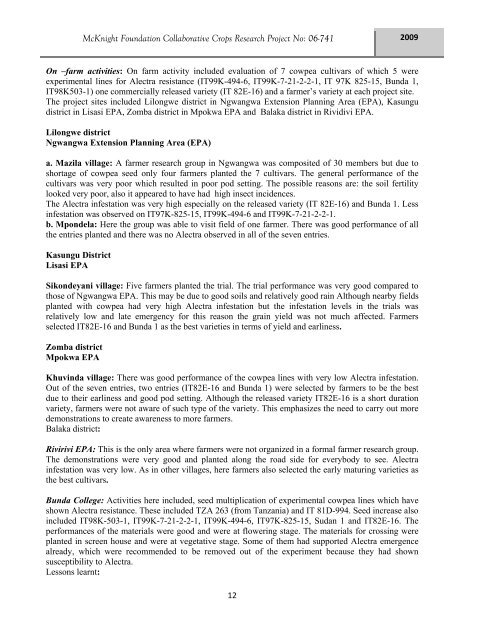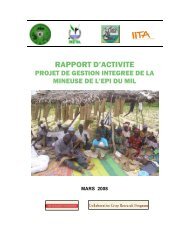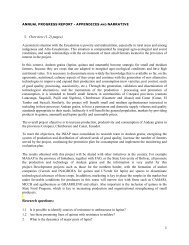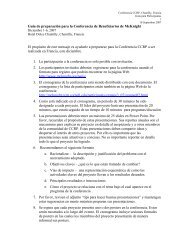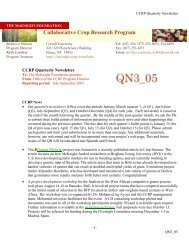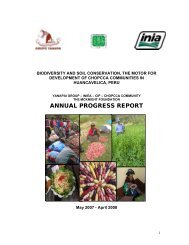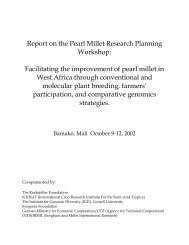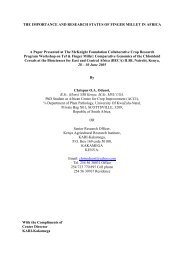English - McKnight Foundation Collaborative Crop Research Program
English - McKnight Foundation Collaborative Crop Research Program
English - McKnight Foundation Collaborative Crop Research Program
Create successful ePaper yourself
Turn your PDF publications into a flip-book with our unique Google optimized e-Paper software.
<strong>McKnight</strong> <strong>Foundation</strong> <strong>Collaborative</strong> <strong>Crop</strong>s <strong>Research</strong> Project No: 06-741<br />
On –farm activities: On farm activity included evaluation of 7 cowpea cultivars of which 5 were<br />
experimental lines for Alectra resistance (IT99K-494-6, IT99K-7-21-2-2-1, IT 97K 825-15, Bunda 1,<br />
IT98K503-1) one commercially released variety (IT 82E-16) and a farmer’s variety at each project site.<br />
The project sites included Lilongwe district in Ngwangwa Extension Planning Area (EPA), Kasungu<br />
district in Lisasi EPA, Zomba district in Mpokwa EPA and Balaka district in Rividivi EPA.<br />
Lilongwe district<br />
Ngwangwa Extension Planning Area (EPA)<br />
a. Mazila village: A farmer research group in Ngwangwa was composited of 30 members but due to<br />
shortage of cowpea seed only four farmers planted the 7 cultivars. The general performance of the<br />
cultivars was very poor which resulted in poor pod setting. The possible reasons are: the soil fertility<br />
looked very poor, also it appeared to have had high insect incidences.<br />
The Alectra infestation was very high especially on the released variety (IT 82E-16) and Bunda 1. Less<br />
infestation was observed on IT97K-825-15, IT99K-494-6 and IT99K-7-21-2-2-1.<br />
b. Mpondela: Here the group was able to visit field of one farmer. There was good performance of all<br />
the entries planted and there was no Alectra observed in all of the seven entries.<br />
Kasungu District<br />
Lisasi EPA<br />
Sikondeyani village: Five farmers planted the trial. The trial performance was very good compared to<br />
those of Ngwangwa EPA. This may be due to good soils and relatively good rain Although nearby fields<br />
planted with cowpea had very high Alectra infestation but the infestation levels in the trials was<br />
relatively low and late emergency for this reason the grain yield was not much affected. Farmers<br />
selected IT82E-16 and Bunda 1 as the best varieties in terms of yield and earliness.<br />
Zomba district<br />
Mpokwa EPA<br />
Khuvinda village: There was good performance of the cowpea lines with very low Alectra infestation.<br />
Out of the seven entries, two entries (IT82E-16 and Bunda 1) were selected by farmers to be the best<br />
due to their earliness and good pod setting. Although the released variety IT82E-16 is a short duration<br />
variety, farmers were not aware of such type of the variety. This emphasizes the need to carry out more<br />
demonstrations to create awareness to more farmers.<br />
Balaka district:<br />
Rivirivi EPA: This is the only area where farmers were not organized in a formal farmer research group.<br />
The demonstrations were very good and planted along the road side for everybody to see. Alectra<br />
infestation was very low. As in other villages, here farmers also selected the early maturing varieties as<br />
the best cultivars.<br />
Bunda College: Activities here included, seed multiplication of experimental cowpea lines which have<br />
shown Alectra resistance. These included TZA 263 (from Tanzania) and IT 81D-994. Seed increase also<br />
included IT98K-503-1, IT99K-7-21-2-2-1, IT99K-494-6, IT97K-825-15, Sudan 1 and IT82E-16. The<br />
performances of the materials were good and were at flowering stage. The materials for crossing were<br />
planted in screen house and were at vegetative stage. Some of them had supported Alectra emergence<br />
already, which were recommended to be removed out of the experiment because they had shown<br />
susceptibility to Alectra.<br />
Lessons learnt:<br />
12<br />
2009


